Evaluating Communication Strategies for Mr. Fishy Restaurant
VerifiedAdded on 2021/02/20
|7
|1821
|32
Report
AI Summary
This report provides a comprehensive analysis of communication practices within Mr. Fishy Restaurant, focusing on the challenges posed by Brexit and the diverse opinions of employees. It delves into various forms of organizational communication, including formal, informal, directional, internal, external, oral, and written methods, highlighting their roles in achieving business objectives. The report examines the principles of effective communication, such as clarity, accuracy, attentiveness, relevancy, and language control, and how these principles can enhance the restaurant's working culture and relationships with employees. Furthermore, it evaluates the current communication practices, identifying potential areas for improvement and offering strategies to overcome communication barriers, ultimately aiming to strengthen the restaurant's brand value and overall performance within the competitive market. The report concludes by emphasizing the significance of effective communication in achieving business goals and fostering a healthy work environment.
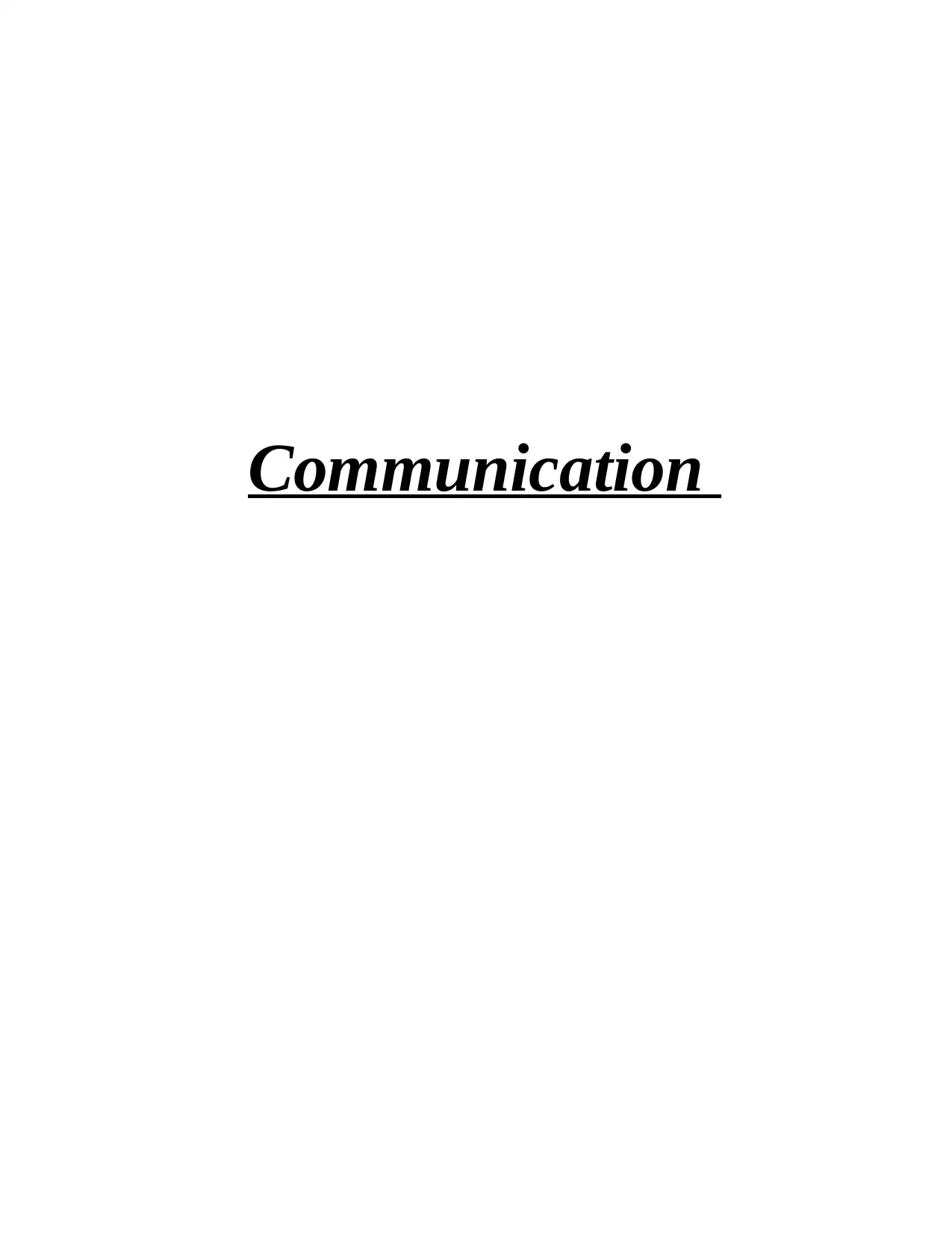
Communication
Paraphrase This Document
Need a fresh take? Get an instant paraphrase of this document with our AI Paraphraser
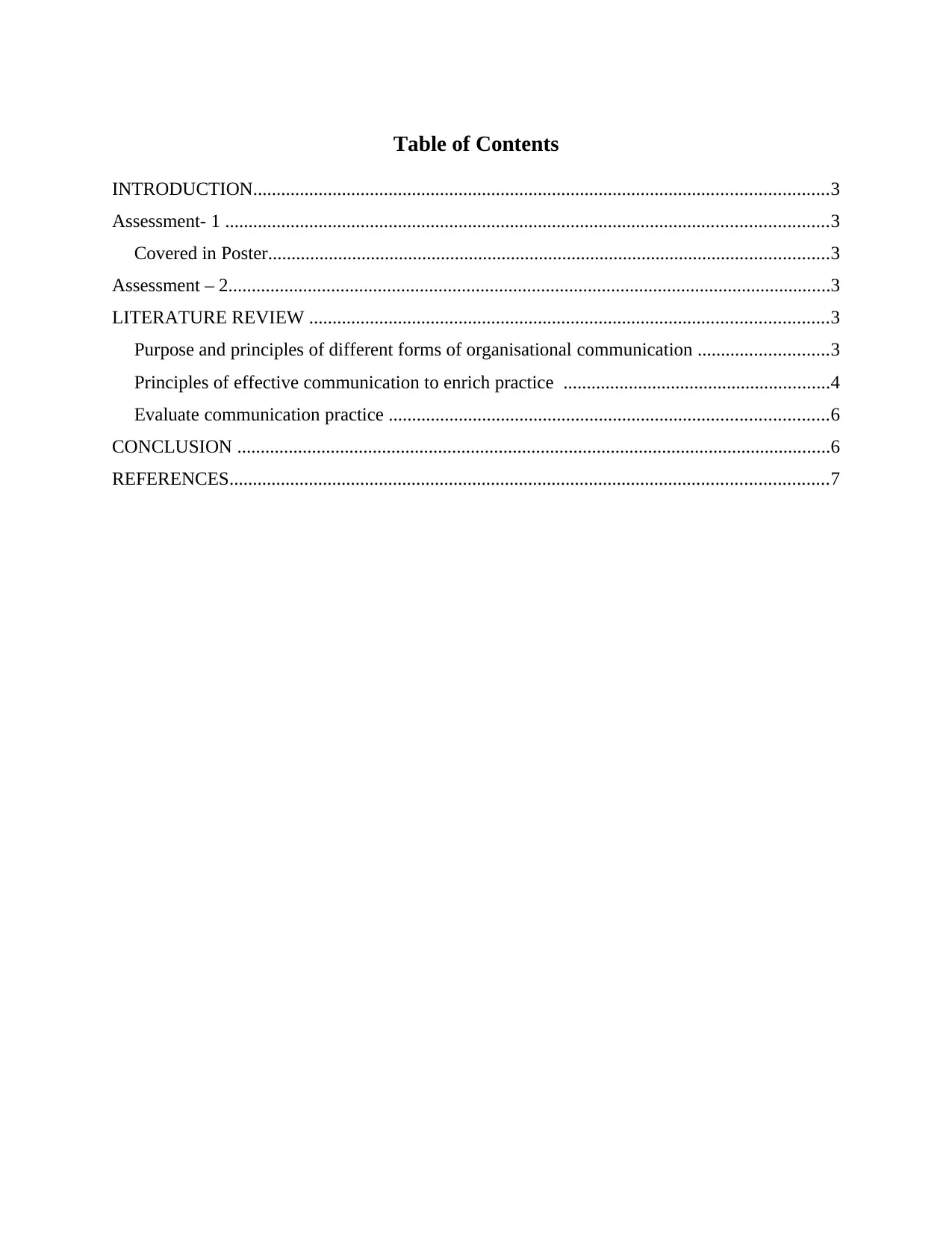
Table of Contents
INTRODUCTION...........................................................................................................................3
Assessment- 1 .................................................................................................................................3
Covered in Poster........................................................................................................................3
Assessment – 2.................................................................................................................................3
LITERATURE REVIEW ...............................................................................................................3
Purpose and principles of different forms of organisational communication ............................3
Principles of effective communication to enrich practice .........................................................4
Evaluate communication practice ..............................................................................................6
CONCLUSION ...............................................................................................................................6
REFERENCES................................................................................................................................7
INTRODUCTION...........................................................................................................................3
Assessment- 1 .................................................................................................................................3
Covered in Poster........................................................................................................................3
Assessment – 2.................................................................................................................................3
LITERATURE REVIEW ...............................................................................................................3
Purpose and principles of different forms of organisational communication ............................3
Principles of effective communication to enrich practice .........................................................4
Evaluate communication practice ..............................................................................................6
CONCLUSION ...............................................................................................................................6
REFERENCES................................................................................................................................7
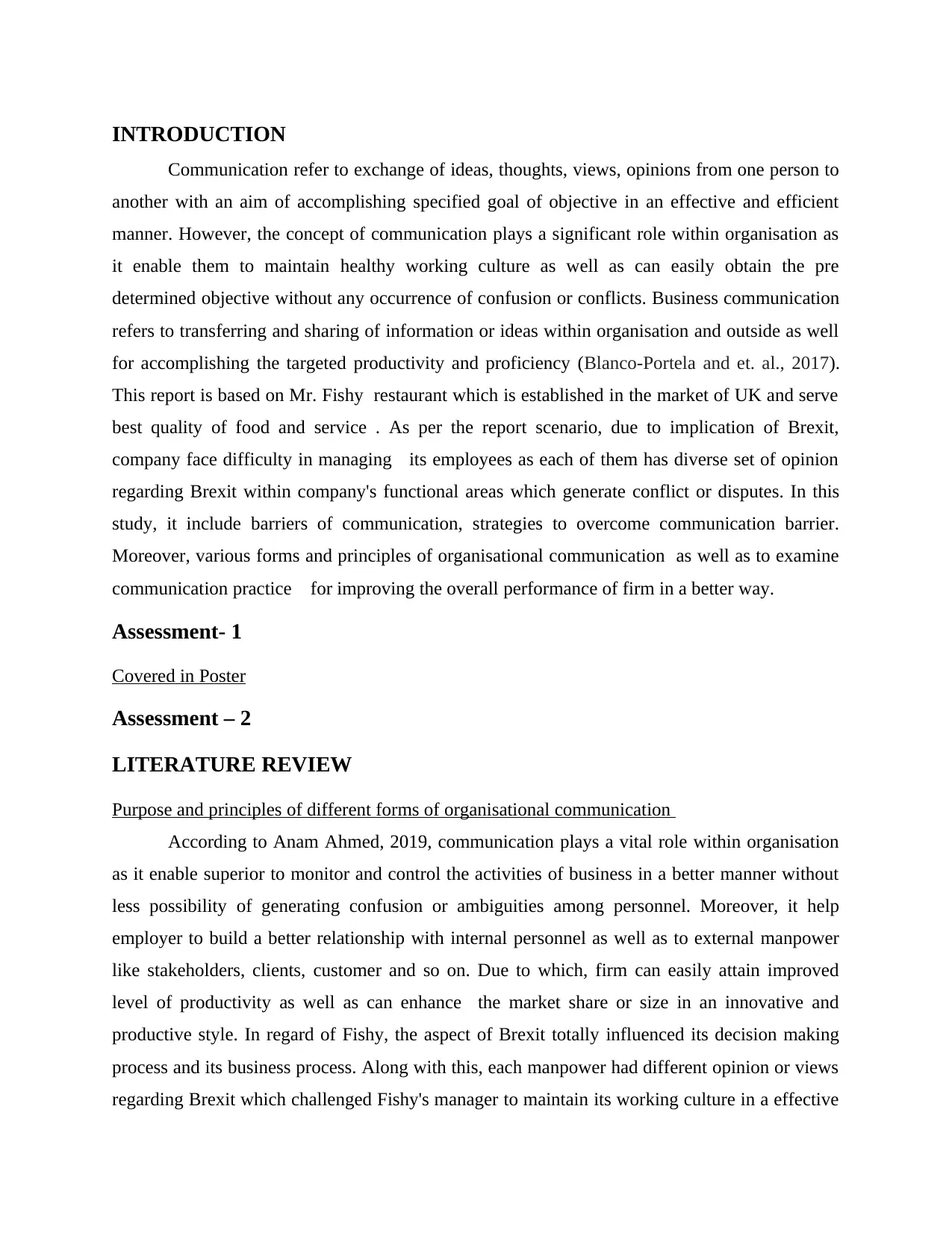
INTRODUCTION
Communication refer to exchange of ideas, thoughts, views, opinions from one person to
another with an aim of accomplishing specified goal of objective in an effective and efficient
manner. However, the concept of communication plays a significant role within organisation as
it enable them to maintain healthy working culture as well as can easily obtain the pre
determined objective without any occurrence of confusion or conflicts. Business communication
refers to transferring and sharing of information or ideas within organisation and outside as well
for accomplishing the targeted productivity and proficiency (Blanco-Portela and et. al., 2017).
This report is based on Mr. Fishy restaurant which is established in the market of UK and serve
best quality of food and service . As per the report scenario, due to implication of Brexit,
company face difficulty in managing its employees as each of them has diverse set of opinion
regarding Brexit within company's functional areas which generate conflict or disputes. In this
study, it include barriers of communication, strategies to overcome communication barrier.
Moreover, various forms and principles of organisational communication as well as to examine
communication practice for improving the overall performance of firm in a better way.
Assessment- 1
Covered in Poster
Assessment – 2
LITERATURE REVIEW
Purpose and principles of different forms of organisational communication
According to Anam Ahmed, 2019, communication plays a vital role within organisation
as it enable superior to monitor and control the activities of business in a better manner without
less possibility of generating confusion or ambiguities among personnel. Moreover, it help
employer to build a better relationship with internal personnel as well as to external manpower
like stakeholders, clients, customer and so on. Due to which, firm can easily attain improved
level of productivity as well as can enhance the market share or size in an innovative and
productive style. In regard of Fishy, the aspect of Brexit totally influenced its decision making
process and its business process. Along with this, each manpower had different opinion or views
regarding Brexit which challenged Fishy's manager to maintain its working culture in a effective
Communication refer to exchange of ideas, thoughts, views, opinions from one person to
another with an aim of accomplishing specified goal of objective in an effective and efficient
manner. However, the concept of communication plays a significant role within organisation as
it enable them to maintain healthy working culture as well as can easily obtain the pre
determined objective without any occurrence of confusion or conflicts. Business communication
refers to transferring and sharing of information or ideas within organisation and outside as well
for accomplishing the targeted productivity and proficiency (Blanco-Portela and et. al., 2017).
This report is based on Mr. Fishy restaurant which is established in the market of UK and serve
best quality of food and service . As per the report scenario, due to implication of Brexit,
company face difficulty in managing its employees as each of them has diverse set of opinion
regarding Brexit within company's functional areas which generate conflict or disputes. In this
study, it include barriers of communication, strategies to overcome communication barrier.
Moreover, various forms and principles of organisational communication as well as to examine
communication practice for improving the overall performance of firm in a better way.
Assessment- 1
Covered in Poster
Assessment – 2
LITERATURE REVIEW
Purpose and principles of different forms of organisational communication
According to Anam Ahmed, 2019, communication plays a vital role within organisation
as it enable superior to monitor and control the activities of business in a better manner without
less possibility of generating confusion or ambiguities among personnel. Moreover, it help
employer to build a better relationship with internal personnel as well as to external manpower
like stakeholders, clients, customer and so on. Due to which, firm can easily attain improved
level of productivity as well as can enhance the market share or size in an innovative and
productive style. In regard of Fishy, the aspect of Brexit totally influenced its decision making
process and its business process. Along with this, each manpower had different opinion or views
regarding Brexit which challenged Fishy's manager to maintain its working culture in a effective
⊘ This is a preview!⊘
Do you want full access?
Subscribe today to unlock all pages.

Trusted by 1+ million students worldwide
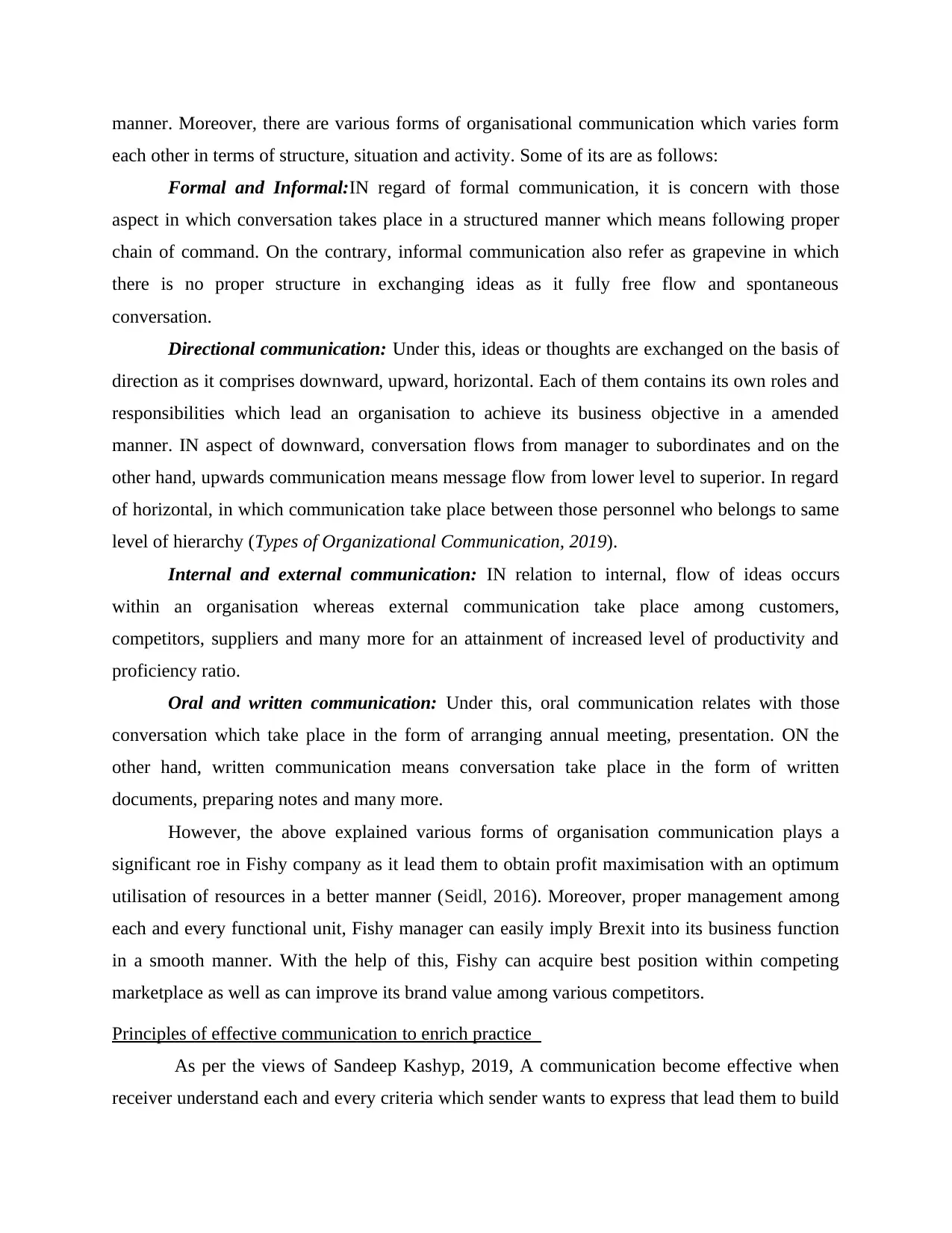
manner. Moreover, there are various forms of organisational communication which varies form
each other in terms of structure, situation and activity. Some of its are as follows:
Formal and Informal:IN regard of formal communication, it is concern with those
aspect in which conversation takes place in a structured manner which means following proper
chain of command. On the contrary, informal communication also refer as grapevine in which
there is no proper structure in exchanging ideas as it fully free flow and spontaneous
conversation.
Directional communication: Under this, ideas or thoughts are exchanged on the basis of
direction as it comprises downward, upward, horizontal. Each of them contains its own roles and
responsibilities which lead an organisation to achieve its business objective in a amended
manner. IN aspect of downward, conversation flows from manager to subordinates and on the
other hand, upwards communication means message flow from lower level to superior. In regard
of horizontal, in which communication take place between those personnel who belongs to same
level of hierarchy (Types of Organizational Communication, 2019).
Internal and external communication: IN relation to internal, flow of ideas occurs
within an organisation whereas external communication take place among customers,
competitors, suppliers and many more for an attainment of increased level of productivity and
proficiency ratio.
Oral and written communication: Under this, oral communication relates with those
conversation which take place in the form of arranging annual meeting, presentation. ON the
other hand, written communication means conversation take place in the form of written
documents, preparing notes and many more.
However, the above explained various forms of organisation communication plays a
significant roe in Fishy company as it lead them to obtain profit maximisation with an optimum
utilisation of resources in a better manner (Seidl, 2016). Moreover, proper management among
each and every functional unit, Fishy manager can easily imply Brexit into its business function
in a smooth manner. With the help of this, Fishy can acquire best position within competing
marketplace as well as can improve its brand value among various competitors.
Principles of effective communication to enrich practice
As per the views of Sandeep Kashyp, 2019, A communication become effective when
receiver understand each and every criteria which sender wants to express that lead them to build
each other in terms of structure, situation and activity. Some of its are as follows:
Formal and Informal:IN regard of formal communication, it is concern with those
aspect in which conversation takes place in a structured manner which means following proper
chain of command. On the contrary, informal communication also refer as grapevine in which
there is no proper structure in exchanging ideas as it fully free flow and spontaneous
conversation.
Directional communication: Under this, ideas or thoughts are exchanged on the basis of
direction as it comprises downward, upward, horizontal. Each of them contains its own roles and
responsibilities which lead an organisation to achieve its business objective in a amended
manner. IN aspect of downward, conversation flows from manager to subordinates and on the
other hand, upwards communication means message flow from lower level to superior. In regard
of horizontal, in which communication take place between those personnel who belongs to same
level of hierarchy (Types of Organizational Communication, 2019).
Internal and external communication: IN relation to internal, flow of ideas occurs
within an organisation whereas external communication take place among customers,
competitors, suppliers and many more for an attainment of increased level of productivity and
proficiency ratio.
Oral and written communication: Under this, oral communication relates with those
conversation which take place in the form of arranging annual meeting, presentation. ON the
other hand, written communication means conversation take place in the form of written
documents, preparing notes and many more.
However, the above explained various forms of organisation communication plays a
significant roe in Fishy company as it lead them to obtain profit maximisation with an optimum
utilisation of resources in a better manner (Seidl, 2016). Moreover, proper management among
each and every functional unit, Fishy manager can easily imply Brexit into its business function
in a smooth manner. With the help of this, Fishy can acquire best position within competing
marketplace as well as can improve its brand value among various competitors.
Principles of effective communication to enrich practice
As per the views of Sandeep Kashyp, 2019, A communication become effective when
receiver understand each and every criteria which sender wants to express that lead them to build
Paraphrase This Document
Need a fresh take? Get an instant paraphrase of this document with our AI Paraphraser
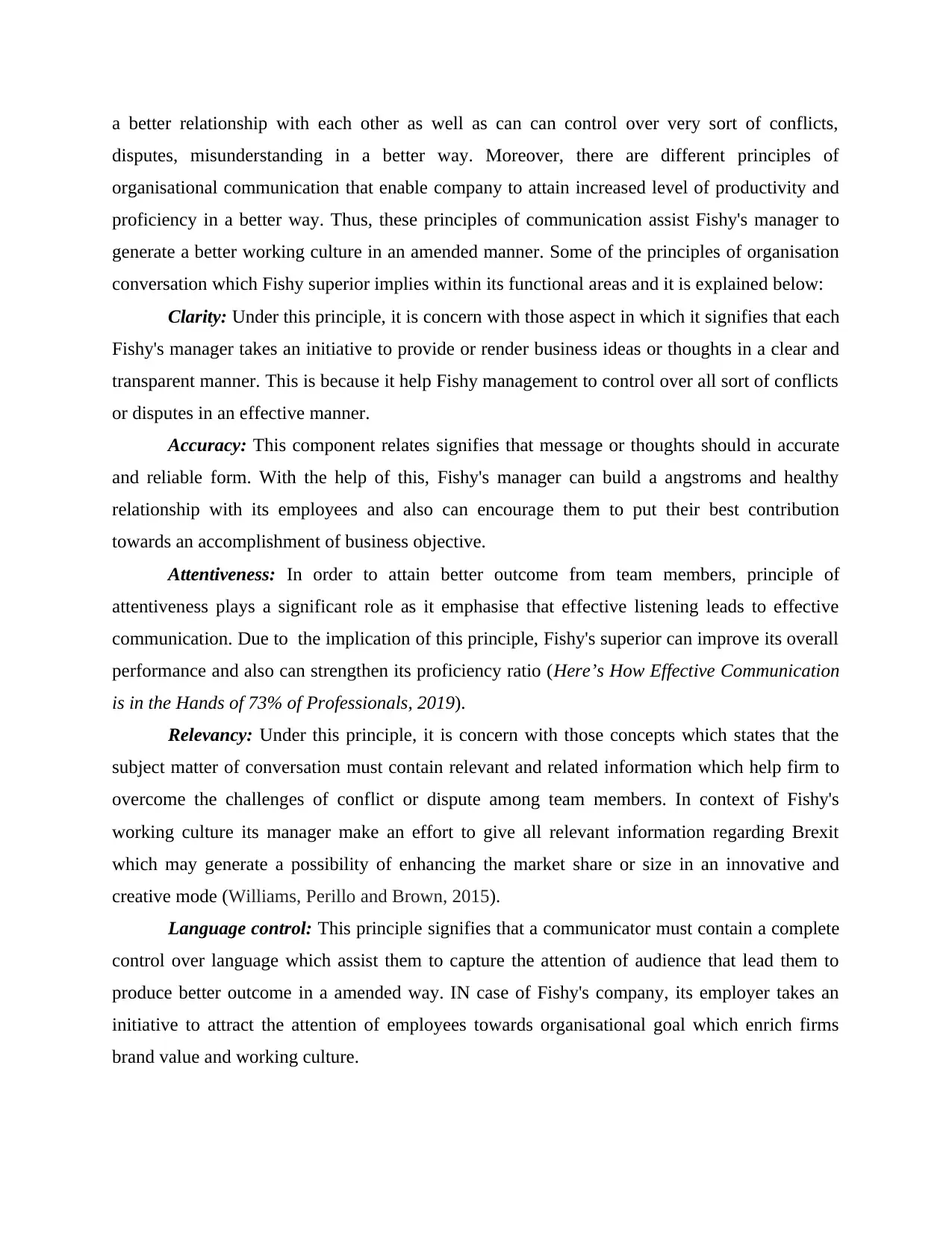
a better relationship with each other as well as can can control over very sort of conflicts,
disputes, misunderstanding in a better way. Moreover, there are different principles of
organisational communication that enable company to attain increased level of productivity and
proficiency in a better way. Thus, these principles of communication assist Fishy's manager to
generate a better working culture in an amended manner. Some of the principles of organisation
conversation which Fishy superior implies within its functional areas and it is explained below:
Clarity: Under this principle, it is concern with those aspect in which it signifies that each
Fishy's manager takes an initiative to provide or render business ideas or thoughts in a clear and
transparent manner. This is because it help Fishy management to control over all sort of conflicts
or disputes in an effective manner.
Accuracy: This component relates signifies that message or thoughts should in accurate
and reliable form. With the help of this, Fishy's manager can build a angstroms and healthy
relationship with its employees and also can encourage them to put their best contribution
towards an accomplishment of business objective.
Attentiveness: In order to attain better outcome from team members, principle of
attentiveness plays a significant role as it emphasise that effective listening leads to effective
communication. Due to the implication of this principle, Fishy's superior can improve its overall
performance and also can strengthen its proficiency ratio (Here’s How Effective Communication
is in the Hands of 73% of Professionals, 2019).
Relevancy: Under this principle, it is concern with those concepts which states that the
subject matter of conversation must contain relevant and related information which help firm to
overcome the challenges of conflict or dispute among team members. In context of Fishy's
working culture its manager make an effort to give all relevant information regarding Brexit
which may generate a possibility of enhancing the market share or size in an innovative and
creative mode (Williams, Perillo and Brown, 2015).
Language control: This principle signifies that a communicator must contain a complete
control over language which assist them to capture the attention of audience that lead them to
produce better outcome in a amended way. IN case of Fishy's company, its employer takes an
initiative to attract the attention of employees towards organisational goal which enrich firms
brand value and working culture.
disputes, misunderstanding in a better way. Moreover, there are different principles of
organisational communication that enable company to attain increased level of productivity and
proficiency in a better way. Thus, these principles of communication assist Fishy's manager to
generate a better working culture in an amended manner. Some of the principles of organisation
conversation which Fishy superior implies within its functional areas and it is explained below:
Clarity: Under this principle, it is concern with those aspect in which it signifies that each
Fishy's manager takes an initiative to provide or render business ideas or thoughts in a clear and
transparent manner. This is because it help Fishy management to control over all sort of conflicts
or disputes in an effective manner.
Accuracy: This component relates signifies that message or thoughts should in accurate
and reliable form. With the help of this, Fishy's manager can build a angstroms and healthy
relationship with its employees and also can encourage them to put their best contribution
towards an accomplishment of business objective.
Attentiveness: In order to attain better outcome from team members, principle of
attentiveness plays a significant role as it emphasise that effective listening leads to effective
communication. Due to the implication of this principle, Fishy's superior can improve its overall
performance and also can strengthen its proficiency ratio (Here’s How Effective Communication
is in the Hands of 73% of Professionals, 2019).
Relevancy: Under this principle, it is concern with those concepts which states that the
subject matter of conversation must contain relevant and related information which help firm to
overcome the challenges of conflict or dispute among team members. In context of Fishy's
working culture its manager make an effort to give all relevant information regarding Brexit
which may generate a possibility of enhancing the market share or size in an innovative and
creative mode (Williams, Perillo and Brown, 2015).
Language control: This principle signifies that a communicator must contain a complete
control over language which assist them to capture the attention of audience that lead them to
produce better outcome in a amended way. IN case of Fishy's company, its employer takes an
initiative to attract the attention of employees towards organisational goal which enrich firms
brand value and working culture.
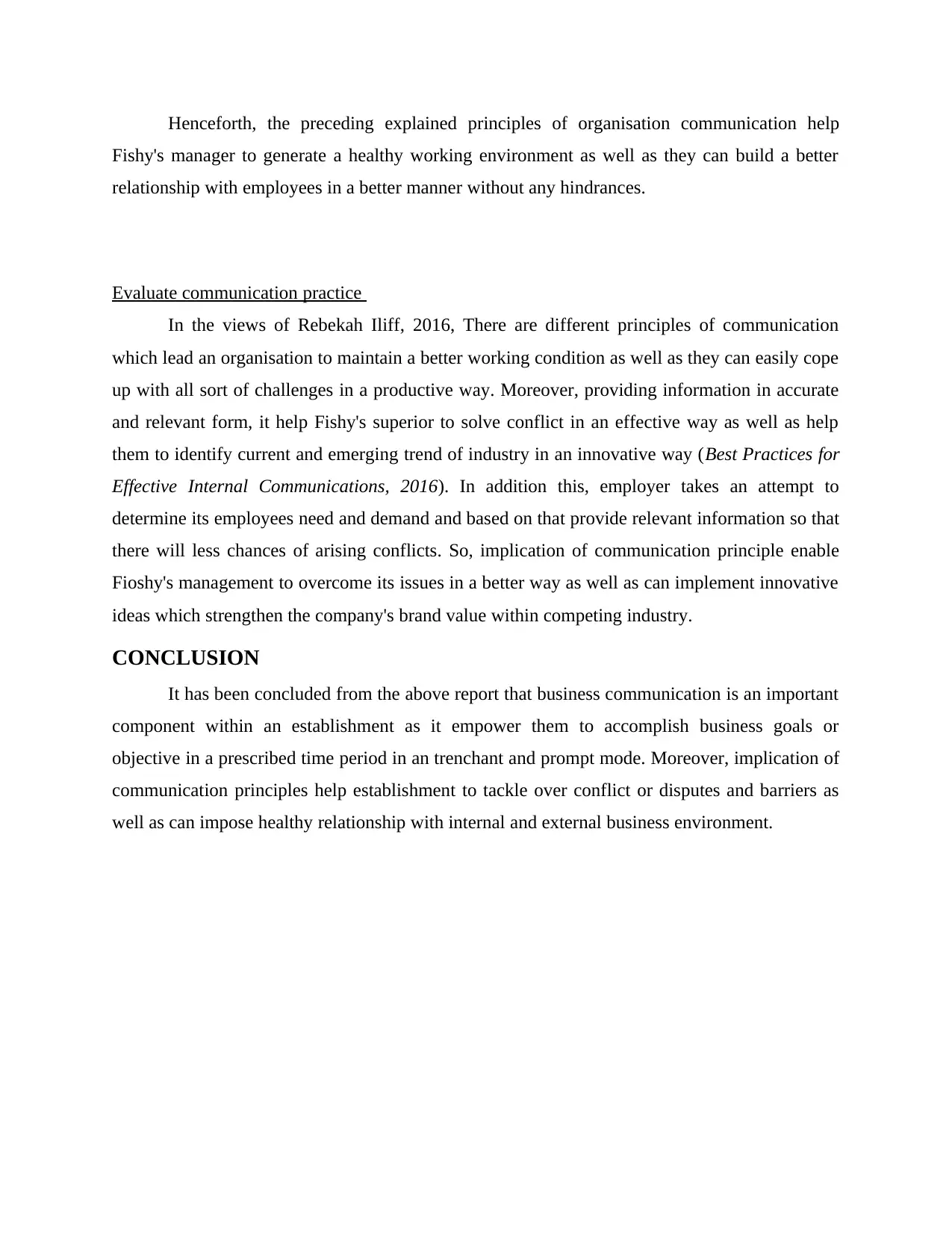
Henceforth, the preceding explained principles of organisation communication help
Fishy's manager to generate a healthy working environment as well as they can build a better
relationship with employees in a better manner without any hindrances.
Evaluate communication practice
In the views of Rebekah Iliff, 2016, There are different principles of communication
which lead an organisation to maintain a better working condition as well as they can easily cope
up with all sort of challenges in a productive way. Moreover, providing information in accurate
and relevant form, it help Fishy's superior to solve conflict in an effective way as well as help
them to identify current and emerging trend of industry in an innovative way (Best Practices for
Effective Internal Communications, 2016). In addition this, employer takes an attempt to
determine its employees need and demand and based on that provide relevant information so that
there will less chances of arising conflicts. So, implication of communication principle enable
Fioshy's management to overcome its issues in a better way as well as can implement innovative
ideas which strengthen the company's brand value within competing industry.
CONCLUSION
It has been concluded from the above report that business communication is an important
component within an establishment as it empower them to accomplish business goals or
objective in a prescribed time period in an trenchant and prompt mode. Moreover, implication of
communication principles help establishment to tackle over conflict or disputes and barriers as
well as can impose healthy relationship with internal and external business environment.
Fishy's manager to generate a healthy working environment as well as they can build a better
relationship with employees in a better manner without any hindrances.
Evaluate communication practice
In the views of Rebekah Iliff, 2016, There are different principles of communication
which lead an organisation to maintain a better working condition as well as they can easily cope
up with all sort of challenges in a productive way. Moreover, providing information in accurate
and relevant form, it help Fishy's superior to solve conflict in an effective way as well as help
them to identify current and emerging trend of industry in an innovative way (Best Practices for
Effective Internal Communications, 2016). In addition this, employer takes an attempt to
determine its employees need and demand and based on that provide relevant information so that
there will less chances of arising conflicts. So, implication of communication principle enable
Fioshy's management to overcome its issues in a better way as well as can implement innovative
ideas which strengthen the company's brand value within competing industry.
CONCLUSION
It has been concluded from the above report that business communication is an important
component within an establishment as it empower them to accomplish business goals or
objective in a prescribed time period in an trenchant and prompt mode. Moreover, implication of
communication principles help establishment to tackle over conflict or disputes and barriers as
well as can impose healthy relationship with internal and external business environment.
⊘ This is a preview!⊘
Do you want full access?
Subscribe today to unlock all pages.

Trusted by 1+ million students worldwide
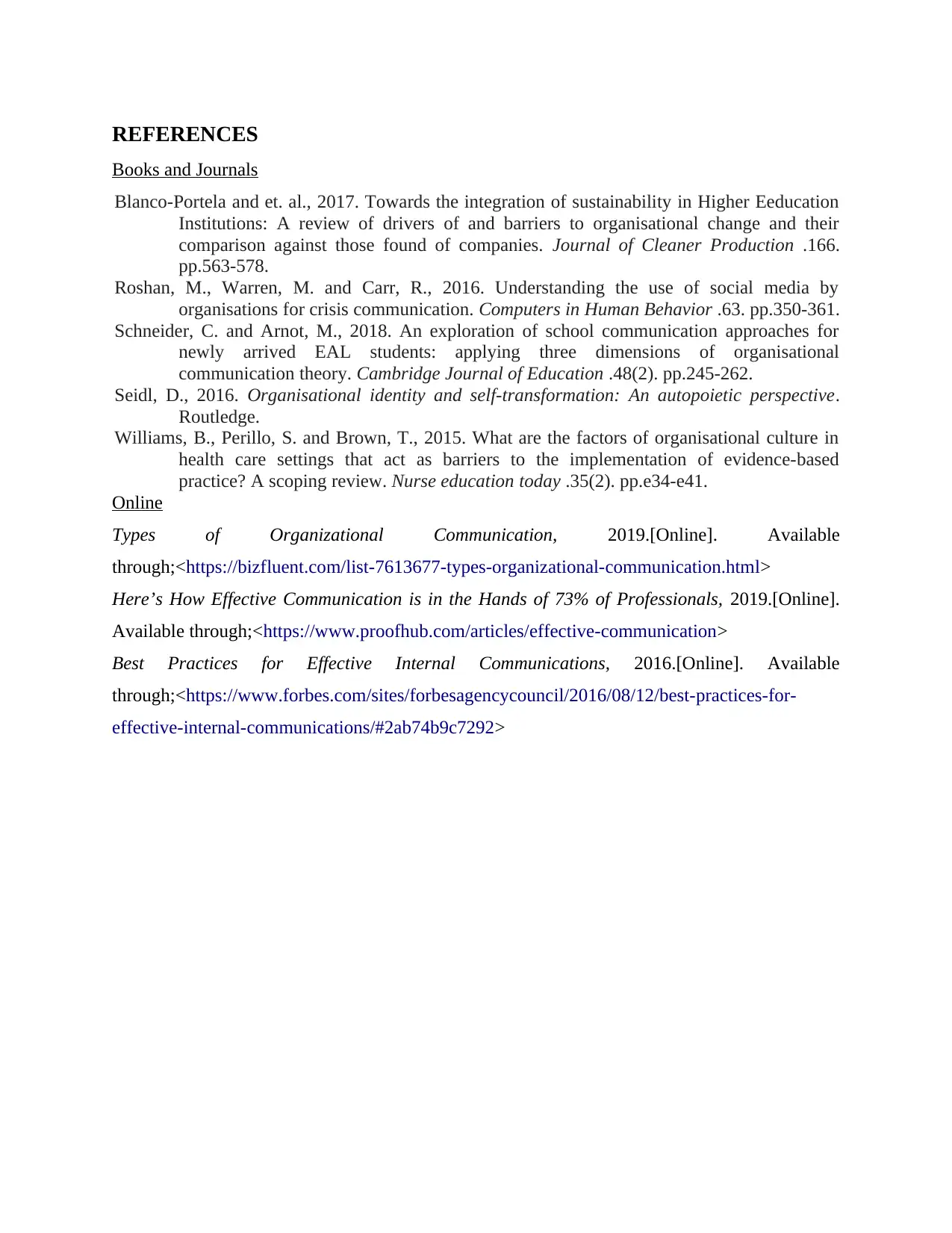
REFERENCES
Books and Journals
Blanco-Portela and et. al., 2017. Towards the integration of sustainability in Higher Eeducation
Institutions: A review of drivers of and barriers to organisational change and their
comparison against those found of companies. Journal of Cleaner Production .166.
pp.563-578.
Roshan, M., Warren, M. and Carr, R., 2016. Understanding the use of social media by
organisations for crisis communication. Computers in Human Behavior .63. pp.350-361.
Schneider, C. and Arnot, M., 2018. An exploration of school communication approaches for
newly arrived EAL students: applying three dimensions of organisational
communication theory. Cambridge Journal of Education .48(2). pp.245-262.
Seidl, D., 2016. Organisational identity and self-transformation: An autopoietic perspective.
Routledge.
Williams, B., Perillo, S. and Brown, T., 2015. What are the factors of organisational culture in
health care settings that act as barriers to the implementation of evidence-based
practice? A scoping review. Nurse education today .35(2). pp.e34-e41.
Online
Types of Organizational Communication, 2019.[Online]. Available
through;<https://bizfluent.com/list-7613677-types-organizational-communication.html>
Here’s How Effective Communication is in the Hands of 73% of Professionals, 2019.[Online].
Available through;<https://www.proofhub.com/articles/effective-communication>
Best Practices for Effective Internal Communications, 2016.[Online]. Available
through;<https://www.forbes.com/sites/forbesagencycouncil/2016/08/12/best-practices-for-
effective-internal-communications/#2ab74b9c7292>
Books and Journals
Blanco-Portela and et. al., 2017. Towards the integration of sustainability in Higher Eeducation
Institutions: A review of drivers of and barriers to organisational change and their
comparison against those found of companies. Journal of Cleaner Production .166.
pp.563-578.
Roshan, M., Warren, M. and Carr, R., 2016. Understanding the use of social media by
organisations for crisis communication. Computers in Human Behavior .63. pp.350-361.
Schneider, C. and Arnot, M., 2018. An exploration of school communication approaches for
newly arrived EAL students: applying three dimensions of organisational
communication theory. Cambridge Journal of Education .48(2). pp.245-262.
Seidl, D., 2016. Organisational identity and self-transformation: An autopoietic perspective.
Routledge.
Williams, B., Perillo, S. and Brown, T., 2015. What are the factors of organisational culture in
health care settings that act as barriers to the implementation of evidence-based
practice? A scoping review. Nurse education today .35(2). pp.e34-e41.
Online
Types of Organizational Communication, 2019.[Online]. Available
through;<https://bizfluent.com/list-7613677-types-organizational-communication.html>
Here’s How Effective Communication is in the Hands of 73% of Professionals, 2019.[Online].
Available through;<https://www.proofhub.com/articles/effective-communication>
Best Practices for Effective Internal Communications, 2016.[Online]. Available
through;<https://www.forbes.com/sites/forbesagencycouncil/2016/08/12/best-practices-for-
effective-internal-communications/#2ab74b9c7292>
1 out of 7
Related Documents
Your All-in-One AI-Powered Toolkit for Academic Success.
+13062052269
info@desklib.com
Available 24*7 on WhatsApp / Email
![[object Object]](/_next/static/media/star-bottom.7253800d.svg)
Unlock your academic potential
Copyright © 2020–2026 A2Z Services. All Rights Reserved. Developed and managed by ZUCOL.





